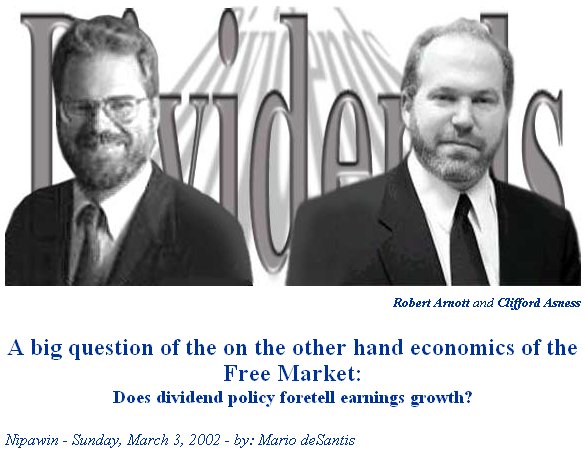Learning Stories
by
Mario deSantis
mariodesantis@hotmail.com
“I am a Canadian, free to speak without fear, free to worship in my own way, free to stand for what I think right, free to oppose what I believe wrong, and free to choose those who shall govern my country.” - -The Rt. Hon. John Diefenbaker, Canadian Bill of Rights, 1960
“The whole judicial system is at issue, it's worth more than one person.”--Serge Kujawa, Saskatchewan Crown Prosecutor, 1991
“The system is not more worth than one person's rights.”--Mario deSantis, 2002
Ensign Stories © Mario deSantis and Ensign
|
|
We have been pointing out in our writing that in the last decade we experienced the creation of big bubbles in the stock market as the stock price over earnings ratio increased two fold from a traditional ratio of 15 to more than 30. Enron, Global Crossing, Tyco, and many other companies were all able to manipulate further increases of their stock prices while their senior executives were able to sell off their stocks and make millions and millions of dollars in the process. Eventually, the scheme to ever increase the stock price would collapse and so did these companies. Kenneth Lay, former Enron's CEO, made $135-million in salary and exercising stock options in 2000; Gary Winnick, founder of Global Crossing, made $633 million by selling his company's stock in the two years prior to the company's collapse; and Dennis Kozlowski, Tyco's chief executive, netted more than $170 million by selling shares five months before it was subjected to a Securities and Exchange Commission (SEC) inquiry in December 1999. There is no doubt that our financial and economic systems are corrupt as these companies have caused pains to their employees, procured money to politicians, avoided paying taxes by setting offshore companies, concerted with their law and accounting firms to defraud shareholders and employees at large. Today, we have business gurus who are using statistical financial analysis to reassure the public that everything is all right with our financial system. We must understand that statistical analysis is being used as a scientific tool by our elitist oligarchy to support the status quo, that is the 'on the other hand economics' of the Free Market. So, we have gurus Robert Arnott and Clifford Asness who have conducted a 'statistically sound' study concluding that "investors should pay more attention to dividends" rather than to increases of the stock price. Clifford Asness has stated that "It seems dividends are a disciplining process. When the market doesn't pay a lot of dividends... Management pursues some less-than-optimal projects." This on other hand truth to look for dividends, as opposed to the on other hand truth to look for increases in the stock prices, is also supported by many Canadian gurus. Morgan McCague, a senior vice-president at the Ontario Teachers Pension Plan Board, is predicting that "dividends will become much more popular"; and James Paulsen, chief investment officer at Wells Capital Management, says that corporate management will face "increasing pressure" to drive dividend payout ratios higher. So the saga of the on the other hand economics of the Free Market continues. References The enemy within USA Inc. America has been rocked by corporate scandals, and there are more to come, says Jamie Doward., Sunday February 3, 2002, The Observer http://www.observer.co.uk/Print/0,3858,4348564,00.html Study links profit to dividends, by Dave Ebner, February 25, 2002, The Globe and Mail Does dividend policy foretell earnings growth? Robert D. Arnott, First Quadrant Corp.; Clifford S. Asness, Aqr Capital Management, December 2001 http://papers.ssrn.com/sol3/papers.cfm?abstract_id=295974 |
